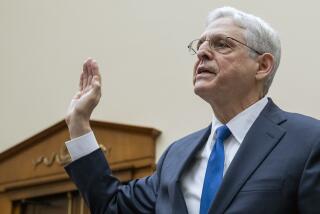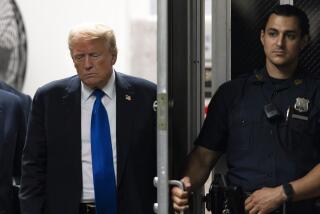Perjury Charges Bogus, Defense Says
- Share via
WASHINGTON — In defending President Clinton against perjury charges, White House Special Counsel Gregory Craig had a relatively easy argument to make Wednesday, but a difficult client to make it for.
There is “an enormous confusion” in the public mind about the president and his grand jury testimony, Craig said in the Senate impeachment trial. What he could not say is that the confusion stems in large measure from the president’s lies about Lewinsky in January.
“Look at the real record [in the grand jury]. Read the transcript. Watch the videotape. Do not rely on anyone else’s version,” Craig told the senators.
In August, the president did not deny having had a sexual relationship with Monica S. Lewinsky. He admitted it, Craig said.
Nor did Clinton deny being alone with the former White House intern, as has been often said. He admitted that, too.
“When I was alone on certain occasions with Ms. Lewinsky . . . “ Clinton said in his opening statement.
This hardly sounds like testimony that would lead to a perjury charge. Usually, a defendant who is charged with perjury has blatantly lied under oath by denying an important accusation.
For example, U.S. District Judge Walter L. Nixon Jr., the last official impeached by the Senate, had gone before a grand jury to deny he had intervened to fix a drug case on a behalf of a wealthy benefactor.
“I had nothing whatsoever officially or unofficially to do with the case,” the judge testified, and “never talked to anyone about it.” But four witnesses, including the local prosecutor with whom Nixon had spoken, testified in a criminal trial, before a House committee and in the Senate trial that the judge’s statement was false.
By contrast, the House Judiciary Committee voted to impeach Clinton for perjury without hearing any witnesses on this point or specifying which of his grand jury statements were false. Committee Democrats urged the Republican majority to spell out the allegedly false statements, as in the Nixon case, but it refused to do so.
Instead, the Republicans voted out a broad, general impeachment charge that says Clinton committed perjury before the grand jury concerning “the nature and details of his relationship” with Lewinsky and by defending his “prior perjurious, false and misleading statements” during his January deposition in the Paula Corbin Jones sexual harassment case.
Normally prosecutors would never bring such a vague charge, Craig said, and a judge would throw it out of court if they did.
Nonetheless, he went on to pick apart the House prosecutors’ many allegations of perjury, some raised for the first time last week.
Rep. James E. Rogan (R-Glendale) claimed Clinton’s opening statement to the grand jury “opened him up to 19 more examples of giving perjurious, false and misleading statements.”
He cited this example: Clinton said, “I regret what began as a friendship came to include this [sexual] conduct.” Rogan said that was a lie because they never had a friendship.
Craig knocked down these claims as “frivolous and trivial.”
Nonetheless, as a defense lawyer, the White House special counsel could not fully explain the dilemma faced by the Senate, since his client contributed greatly to his current plight.
Long before Bill Clinton became the “William Jefferson Clinton” on a trial in the Senate, he had earned a reputation as someone who shades the truth easily and often, at least regarding personal matters. When confronted with an embarrassing question, he avoided a straight answer--and sometimes, told a straight-faced lie.
In his Jones case deposition, Clinton dodged and weaved to avoid giving a straight answer about his sexual contacts with the former intern. A few days later, after the story became public, he looked into the cameras and said, “I did not have sexual relations with that woman.”
The result is that many Americans--including, no doubt, many senators--assume he also lied to the grand jury.
The House prosecutors do as well. Their case is built on the theory that everything Clinton said that could be false is false.
By implication, Craig told the senators to ignore what they may think about the president’s credibility and look at the record.
“The House managers have sought to merge the Jones testimony with the grand jury testimony, to confuse these two events, to blend and blur them together,” he said. Crucially for his defense, the House voted down the impeachment article charging Clinton with perjury in the Jones deposition.
“In the Jones case, the president was evasive, misleading and incomplete in his answers,” Craig conceded. “But in the federal grand jury, President Clinton was forthright and forthcoming. He told the truth.”
More to Read
Sign up for Essential California
The most important California stories and recommendations in your inbox every morning.
You may occasionally receive promotional content from the Los Angeles Times.











